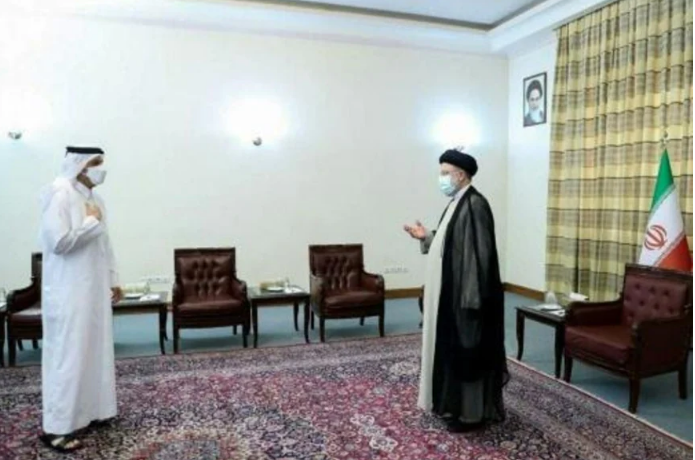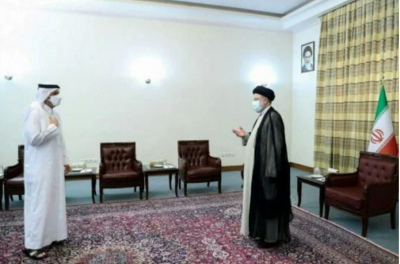Qatar's Foreign Minister Sheikh Mohammed bin Abdulrahman Al Thani arrived in Tehran on Sunday for an unannounced visit, where he met with newly elected Iranian President Ebrahim Raisi, just days after his visit to the United States. Al Thani also met with his Iranian counterpart Mohammad Javad Zarif to discuss "the latest developments regarding bilateral relations between the Islamic Republic of Iran and the State of Qatar, as well as key regional and international issues," according to the Iranian foreign ministry.
Following that, the Qatari minister visited Raisi, marking the latter's first meeting with a foreign official since winning the presidential election on June 18. Raisi affirmed that the Islamic Republic "seeks good for all," as reported by the official news agency IRNA.
The Qatari diplomat's visit follows his earlier meeting with U.S. Secretary of State Antony Blinken in Washington on Thursday, where they discussed "the developments in the region, particularly regarding Afghanistan, Iran, Syria, and Palestine," according to the Qatari foreign ministry. Al Thani emphasized the "urgent need for open and transparent dialogue between the Gulf Cooperation Council countries and Iran to achieve stability in the region."
This visit to both the arch-foes, the United States and the Islamic Republic, comes as Tehran and Washington engage in indirect talks to revive the agreement on Iran's nuclear program. The agreement, established in 2015, lifted many economic sanctions imposed on Iran in exchange for curtailing its nuclear activities and ensuring the peaceful nature of its program. However, the agreement has been threatened since former U.S. President Donald Trump unilaterally withdrew from it in 2018 and reimposed severe sanctions on Tehran. In response, Iran gradually began to roll back many of its core commitments under the agreement one year later.
Iran and the remaining parties to the agreement (Britain, France, Russia, China, and Germany) began discussions in Vienna in early April with indirect U.S. involvement, aiming for a settlement primarily based on Washington's return to the agreement and lifting its sanctions, in exchange for Tehran fully adhering to its commitments. Six rounds of negotiations were held between April and June. Tehran has confirmed that the completion of discussions will not take place before the hardline Raisi officially takes office in early August, succeeding moderate President Hassan Rouhani.
During their meeting on Sunday, Raisi emphasized to Al Thani that "Tehran places special importance on its relationship with Doha," stressing that "neighboring countries are a priority for the upcoming government in Iran."
Doha has previously expressed its willingness to facilitate dialogue between the adversaries Saudi Arabia and Iran in an effort to revive their severed relations since 2016. Recently, Riyadh and Tehran confirmed the start of mediated talks through Baghdad, hoping to reach a "common understanding." Raisi has also asserted after his election that there are "no obstacles" to restoring diplomatic relations with Saudi Arabia.
Additionally, Al Thani's visit comes as the U.S. is nearing the completion of its withdrawal from Iran's neighbor, Afghanistan, where the Taliban is conducting a broad offensive that has resulted in the takeover of large areas of the country. Doha is set to host a new round of talks next week between the Taliban and the Afghan government, having previously hosted representatives from both Afghan sides this month, urging them to make "difficult decisions" to resolve the conflict.
During his meeting with Al Thani, Raisi emphasized that "strengthening stability and enduring security in the region depends on cooperation based on mutual trust among regional countries and practically preventing foreign interventions," according to the official news agency IRNA.




